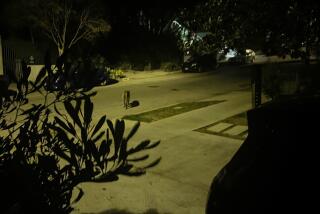Coyote attacks on pets rise sharply in Huntington Beach
It was a typical evening at the Day residence in Huntington Beach. Julie Day had just let her dogs out in the backyard to do their business.
About 20 minutes later, Day, 49, heard a horrific noise and ran to the backyard. She saw her 6-year-old terrier, Elvis, with “his eyes literally bulging out of his head, saliva and bite marks all over his body,” she said.
Elvis survived the attack, but Day said he will probably have severe health issues in the future. His vet bills have already reached $2,400.
“We’re assuming [the coyote] jumped the fence, because there was not one gate open,” Day said. “I’m concerned about other dogs in the neighborhood and young kids. It seems like [the coyotes] have become more brazen.”
Elvis is one of 58 pets reportedly injured or killed by coyotes so far this year in Huntington Beach, according to police. The number was 37 in all of 2014, police said.
“What brings in the coyotes is food,” Huntington Beach police officer Jennifer Marlatt said. “Pet food left outside, unsecured trash and fruit that drops from trees bring the coyotes in from the parks, wetlands, golf courses and flood control channels. They will go for what’s easily accessible instead of hunting for their food.”
As coyotes spend more time around humans, they become more comfortable and are more likely to attack cats and small dogs near houses, Marlatt said.
The attacks on pets have increased recently because coyotes have been breeding, Marlatt said. There were 19 reports of injured or dead pets in July and 11 in August. Such reports averaged about five per month from January through June, Marlatt said.
There have been no reports of attacks on humans, she added.
Marlatt said residents can deal with coyotes by keeping an eye on pets, securing trash bins and avoiding leaving pet food outside.
“Relocating them will not completely eradicate the coyotes and can cause more problems,” she said. “It is dangerous to the coyotes, because if they are relocated to a different area with unfamiliar coyotes, disease could be spread or fights break out, resulting in injury or death.”
California Department of Fish and Wildlife Lt. Kent Smirl said cities have the option to hire a trapper if officials determine that coyotes are a public safety issue.
According to Smirl, the best way to deal with coyotes is to haze them, which means to scare them without doing physical harm.
“Hazing is … teaching an animal how to have fear of humans to save its life,” he said. “Harassment is hurting or annoying the animal.”
Huntington Beach is one of several Orange County cities experiencing an uptick in coyote attacks. Seal Beach made a controversial move last year to trap and euthanize coyotes after several pets in the city were killed. The trapping was halted after a few months, and members of the national Humane Society started teaching residents how to haze the animals.
Huntington Beach resident Mary Watson-Hiber was not as fortunate as Day.
On Sept. 8, she let Benjamin, her 15-year-old dachshund, roam in her backyard before turning in for the night. Watson-Hiber, 71, thought her family had let Benjamin back in the house, and she went to sleep.
About midnight, she heard a high-pitched squeal from outside, and she thought a coyote had just attacked someone else’s animal.
“That morning, I got up and asked my family where Benjamin was,” Watson-Hiber said. “That’s when I looked out the sliding glass door and there he lay. … I put a towel over his body and my neighbor called her vet so they could come and get him.”
Watson-Hiber believes the coyote had gotten through a gap in the fence where her and her neighbor’s properties meet. She said she is going to buy metal mesh to seal the gap. She also plans to buy wolf urine to deter coyotes from coming back.
“We have a yard that’s enclosed, and I think everybody who has an enclosed yard shouldn’t have to worry about wild animals coming in and killing their pets,” she said.
The veterinary office imprinted Benjamin’s paw print in plaster before cremating him. His ashes now sit next to the ashes of Watson-Hiber’s husband, Larry, who died two years ago.
“My husband always called him his therapy dog,” she said.
Twitter: @acocarpio
Carpio writes for Times Community News.
Hoy: Léa esta historia en español
ALSO
1 dead, 1 wounded in stabbings outside Glendale Civic Center
Shock after Junipero Serra statue vandalized days after sainthood declared
Arab royalty misbehavior in Beverly Hills: ‘Who the hell do they think they are?’
More to Read
Sign up for Essential California
The most important California stories and recommendations in your inbox every morning.
You may occasionally receive promotional content from the Los Angeles Times.










